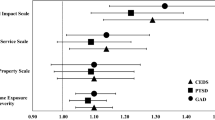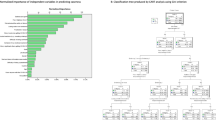Abstract
Although blacks are more likely than whites to experience posttraumatic stress disorder (PTSD) after a natural disaster, the reasons for this disparity are unclear. This study explores whether race is associated with PTSD after adjusting for differences in preexisting vulnerabilities, exposure to stressors, and loss of social support due to Hurricane Katrina using a representative sample of 279 black and white adult current and past smokers who were present when Hurricane Katrina struck, and identified it as the most traumatic event in their lifetime. Multiple logistic regression models evaluated whether differential vulnerability (pre-hurricane physical and mental health functioning, and education level), differential exposure to hurricane-related stressors, and loss of social support deterioration reduced the association of race with PTSD. Blacks were more likely than whites to screen positive for PTSD (49 vs. 39 %, respectively, p = 0.030). Although blacks reported greater pre-hurricane vulnerability (worse mental health functioning and lower educational attainment) and hurricane-related stressor exposure and had less social support after the hurricane, only pre-hurricane mental health functioning attenuated the association of race with screening positive for PTSD. Thus, racial differences in pre-hurricane functioning, particularly poorer mental health, may partially explain racial disparities in PTSD after natural disasters, such as Hurricane Katrina. Future studies should examine these associations prospectively using representative cohorts of black and whites and include measures of residential segregation and discrimination, which may further our understanding of racial disparities in PTSD after a natural disaster.
Similar content being viewed by others
References
Breslau N. The epidemiology of trauma, PTSD, and other posttrauma disorders. Trauma Violence Abuse. 2009;10(3):198–210.
Ramchand R, Rudavsky R, Grant S, Tanielian T, Jaycox L. Prevalence of, risk factors for, and consequences of posttraumatic stress disorder and other mental health problems in military populations deployed to Iraq and Afghanistan. Curr Psychiatry Rep. 2015;17(5):1–11.
Lew HL, Kraft M, Pogoda TK, Amick MM, Woods P, Cifu DX. Prevalence and characteristics of driving difficulties in Operation Iraqi Freedom/Operation Enduring Freedom combat returnees. J Rehabil Res Dev. 2011;48(8):913–25.
Breslau N. Epidemiologic studies of trauma, posttraumatic stress disorder, and other psychiatric disorders. Can J Psychiatry. 2002;47(10):923–9.
Breslau N, Davis GC, Schultz LR. Posttraumatic stress disorder and the incidence of nicotine, alcohol, and other drug disorders in persons who have experienced trauma. Arch Gen Psychiatry. 2003;60(3):289–94.
Kessler RC. Posttraumatic stress disorder: the burden to the individual and to society. J Clin Psychiatry. 2000;61 Suppl 5:4–12.
Farley M, Patsalides BM. Physical symptoms, posttraumatic stress disorder, and healthcare utilization of women with and without childhood physical and sexual abuse. Psychol Rep. 2001;89(3):595–606.
Zayfert C, Dums AR, Ferguson RJ, Hegel MT. Health functioning impairments associated with posttraumatic stress disorder, anxiety disorders, and depression. J Nerv Ment Dis. 2002;190(4):233–40.
Kubzansky LD, Koenen KC, Spiro A, Vokonas PS, Sparrow D. Prospective study of posttraumatic stress disorder symptoms and coronary heart disease in the Normative Aging Study. Arch Gen Psychiatry. 2007;64(1):109–16.
Alegria M, Fortuna LR, Lin JY, Norris FH, Gao S, Takeuchi DT, et al. Prevalence, risk, and correlates of posttraumatic stress disorder across ethnic and racial minority groups in the United States. Med Care. 2013;51(12):1114–23.
Roberts AL, Gilman SE, Breslau J, Breslau N, Koenen KC. Race/ethnic differences in exposure to traumatic events, development of post-traumatic stress disorder, and treatment-seeking for post-traumatic stress disorder in the United States. Psychol Med. 2011;41(01):71–83.
Wallace LR. Risk of trauma exposure and posttraumatic stress disorder: An examination of the separate and combined effects of race, gender, and social context. 2014.
Davidson TM, Price M, McCauley JL, Ruggiero KJ. Disaster impact across cultural groups: comparison of Whites, African Americans, and Latinos. Am J Community Psychol. 2013;52(1–2):97–105.
Davis TD, Sullivan G, Vasterling JJ, Tharp AL, Han X, Deitch EA, et al. Racial variations in postdisaster PTSD among veteran survivors of Hurricane Katrina. Psychol Trauma. 2012;4(5):447–56.
Perilla JL, Norris FH, Lavizzo EA. Ethnicity, culture, and disaster response: identifying and explaining ethnic differences in PTSD six months after Hurricane Andrew. J Soc Clin Psychol. 2002;21(1):20–45.
Ulbrich PM, Warheit GJ, Zimmerman RS. Race, socioeconomic status, and psychological distress: an examination of differential vulnerability. J Health Soc Behav. 1989;30(1):131–46.
Kaniasty K, Norris FH. In search of altruistic community: patterns of social support mobilization following Hurricane Hugo. Am J Community Psychol. 1995;23(4):447–77.
Kaniasty K, Norris FH. A test of the social support deterioration model in the context of natural disaster. J Pers Soc Psychol. 1993;64(3):395–408.
Walsh F. Crisis, trauma, and challenge: a relational resilience approach for healing, transformation, and growth. Smith Coll Stud Soc. 2003;74(1):49–71.
Walsh F. Traumatic loss and major disasters: strengthening family and community resilience. Fam Process. 2007;46(2):207–27.
Cohen S, Wills TA. Stress, social support, and the buffering hypothesis. Psychol Bull. 1985;98(2):310.
Plant EA, Sachs-Ericsson N. Racial and ethnic differences in depression: the roles of social support and meeting basic needs. J Consult Clin Psychol. 2004;72(1):41–52.
Chatters LM, Taylor RJ, Jackson JS, Lincoln KD. Religious coping among African Americans, Caribbean Blacks, and Non-Hispanic Whites. J Commun Psychol. 2008;36(3):371–86.
Sastry N, VanLandingham M. One year later: mental illness prevalence and disparities among New Orleans residents displaced by Hurricane Katrina. Am J Public Health. 2009;99 Suppl 3:S725–31.
Feldner MT, Babson KA, Zvolensky MJ. Smoking, traumatic event exposure, and post-traumatic stress: a critical review of the empirical literature. Clin Psychol Rev. 2007;27(1):14–45.
Moylan S, Jacka FN, Pasco JA, Berk M. Cigarette smoking, nicotine dependence and anxiety disorders: a systematic review of population-based, epidemiological studies. BMC Med. 2012;10(1):123. 7015-10-123.
Breslau N, Peterson EL, Kessler RC, Schultz LR. Short screening scale for DSM-IV posttraumatic stress disorder. Am J Psychiatry. 1999;156(6):908–11.
Ter Smitten M, Smeets R, Van den Brink W. Composite international diagnostic interview (CIDI), version 2.1, 12 months. Amsterdam: World Health Organization; 1998.
Ware Jr JE. SF-36 health survey update. Spine. 2000;25(24):3130–9.
Centers for Disease Control and Prevention (CDC). Self-reported frequent mental distress among adults--United States, 1993–1996. MMWR Morb Mortal Wkly Rep. 1998;47(16):326–31.
Sherbourne CD, Stewart AL. The MOS social support survey. Soc Sci Med. 1991;32(6):705–14.
An AB. Performing logistic regression on survey data with the new SURVEYLOGISTIC procedure. Cary: SAS Institute Inc; 2002.
Baron RM, Kenny DA. The moderator–mediator variable distinction in social psychological research: conceptual, strategic, and statistical considerations. J Pers Soc Psychol. 1986;51(6):1173.
Conner KO, Lee B, Mayers V, Robinson D, Reynolds CF, Albert S, et al. Attitudes and beliefs about mental health among African American older adults suffering from depression. J Aging Stud. 2010;24(4):266–77.
Neighbors HW, Jackson JS, Campbell L, Williams D. The influence of racial factors on psychiatric diagnosis: a review and suggestions for research. Community Ment Health J. 1989;25(4):301–11.
Minsky S, Vega W, Miskimen T, Gara M, Escobar J. Diagnostic patterns in Latino, African American, and European American psychiatric patients. Arch Gen Psychiatry. 2003;60(6):637–44.
Brown C, Schulberg HC, Madonia MJ. Clinical presentations of major depression by African Americans and whites in primary medical care practice. J Affect Disord. 1996;41(3):181–91.
Chung RC, Singer MK. Interpretation of symptom presentation and distress a Southeast Asian refugee example. J Nerv Ment Dis. 1995;183(10):639–48.
American Psychiatric Association. Diagnostic and statistical manual of mental disorders. 5th ed. Arlington: American Psychiatric Publishing; 2013.
Sternthal MJ, Slopen N, Williams DR. Racial disparities in health. Du Bois Rev: Soc Sci Res on Race. 2011;8(01):95–113.
Williams DR, Mohammed SA. Racism and health I: pathways and scientific evidence. Am Behav Sci. 2013;57(8):1–19.
Ehlers A, Mayou RA, Bryant B. Psychological predictors of chronic posttraumatic stress disorder after motor vehicle accidents. J Abnorm Psychol. 1998;107(3):508–19.
Sullivan G, Vasterling JJ, Han X, Tharp AT, Davis T, Deitch EA, et al. Preexisting mental illness and risk for developing a new disorder after Hurricane Katrina. J Nerv Ment Dis. 2013;201(2):161–6.
Weems CF, Pina AA, Costa NM, Watts SE, Taylor LK, Cannon MF. Predisaster trait anxiety and negative affect predict posttraumatic stress in youths after Hurricane Katrina. J Consult Clin Psychol. 2007;75(1):154–9.
McFarlane AC. The long‐term costs of traumatic stress: intertwined physical and psychological consequences. World Psychiatry. 2010;9(1):3–10.
Massey DS, Tannen J. A research note on trends in Black hypersegregation. Demography. 2015;52(3):1–10.
Massey DS, Denton NA. Hypersegregation in US metropolitan areas: black and Hispanic segregation along five dimensions. Demography. 1989;26(3):373–91.
Andersen RM, Mullner RM, Cornelius LJ. Black-white differences in health status: methods or substance? Milbank Q. 1987;65 Suppl 1:72–99.
Campanella R. An ethnic geography of New Orleans. J Am Hist. 2007;94(3):704–15.
Frey WH, Singer A. Katrina and Rita impacts on gulf coast populations: First census findings. Washington, DC: The Brookings Institution, Special Analysis in Metropolitan Policy. 2006.
Author information
Authors and Affiliations
Corresponding author
Ethics declarations
Funding
The study was supported by a National Institute on Drug Abuse grant (1 R21 DA021782-01, K. Ward, PI).
Conflict of interest
All authors declare that they have no competing interests.
Ethical approval
Procedures performed in this study involving human participants were in accordance with the ethical standards of the institutional and/or national research committee and with the 1964 Helsinki declaration and its later amendments (or comparable ethical standards). This protocol was approved as ethical by the University of Memphis’s Institutional Review Board.
Informed consent
Informed consent was obtained from all individual participants included in the study.
Rights and permissions
About this article
Cite this article
Alexander, A.C., Ali, J., McDevitt-Murphy, M.E. et al. Racial Differences in Posttraumatic Stress Disorder Vulnerability Following Hurricane Katrina Among a Sample of Adult Cigarette Smokers from New Orleans. J. Racial and Ethnic Health Disparities 4, 94–103 (2017). https://doi.org/10.1007/s40615-015-0206-8
Received:
Revised:
Accepted:
Published:
Issue Date:
DOI: https://doi.org/10.1007/s40615-015-0206-8




